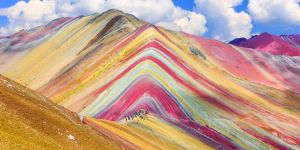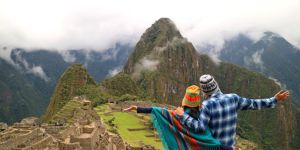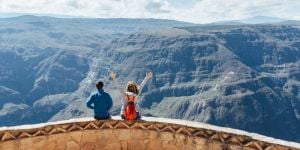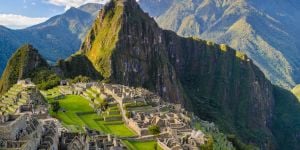Retiring in Peru
Last activity 23 September 2018 by cccmedia
7467 Views
14 replies
Subscribe to the topic
Post new topic
Hello everyone,
Why did you choose to retire in Peru? What are the advantages compared with your home country?
What were your main considerations when deciding to move? For example, taxes, ease of transferring your pension, etc..
Are there any specific formalities you had to go through as a retiree moving to Peru (for example, is there a particular retirement visa)?
What is Peru's healthcare like? Have you had any good or bad experiences dealing with healthcare professionals?
Do you have any tips for other retirees in Peru?
Thank you for sharing your experience.
Priscilla
Hello Priscilla. I'm gonna move to Lima in 2 months. Mine is for work at there for one Turkish company and learn spanish. To get answers of these question will be great! When ı arrive there ı will share my experiences
Hi.
Ive lived here in lima for nearly 13 years .
The good and the not so good .
The good is that this is the city to go out to eat , the best ever,and where i live almost everything including medical treatment is right on my doorstep,litterly within 5 mins walking.
The next good thing is the provinces , even that the roads are somewhat scarey there exist some of the most beautifull places to visit which are definatly more relaxed and friendly .
The parks are the saving grace of Lima which there are many,plus the views from the cliffs are realy something.
My favorite time of the week is sunday, especially early sunday morning, the streets are empty of crazy drivers and the air is much fresher and clean.
The sunday mornings are the time to visite the down town, places like the Lima stock exchange and all the historic building in that area as there are no traffic jams,no people
Now for the not so good.
First the traffic is unbelievable ,and the most crazy i have ever encountered, there is no order, no nothing just a crazy load of drivers who AS YET have not discovered the little stick on the steering colum that indecates their intended direction. I must add that the police drivers are no better having noticed them behaveing exactly the same as the general lima driver NO Indecation of their intended direction.I will add that there are a small percentage of drivers that do show some consideration with their driving and do indecate, and do offer to allow one to turn or pass , these i am afraid realy jump out at one as a huge surprise because it is a real rareity to see one .
Plus when accidents do happen NEVER EVER does the guilty party admit their fault, and they spend hours debating who was at fault. and im talking from pesonal experience. Next is the pollution,my eyes become tired and begin to weep with the pollution, and i notice so many poeple sleeping in the buses and combies .
Regarding the dust.
Never can a shirt be worn for more than a few hours in the summer time ,as the dust sticks to the sweat, especially the collar.
Regarding security.
There are places in lima that realy are no go area,s, i remember my late father in law and one of his comments when driving down a street in such a area. " if harry walked down this street late at night he would emerge with no cloths on" , then added" If i walked down this street i would emerge with no cloths " ( and lucho was a retired high ranking police officer ).
I have had several incidents where persons tried to steal my mobil and the gadget that we open our garage doors with,as yet they were never succesfull, i guess i was lucky..
On the whole lima has some very good sides , some very nice places to visite , abundance of exellant places to eat and some realy beautifull ´places to travell to and spend some quality time.
To finish my opinion of lima . At this moment in time there is no other capital city that i would prefere to live , at least we have ( at this moment in time ) no bombers such as is happening in europe and america actually all round the world.
My only alternative as a place to live would be in the provinces of peru as there are some of the most beautifull peacefull places , only problem being is that the medical side in the provinces is a little lacking .
Long travell to Peru
I think that it is all about choices and desires. I wanted to retire to a place where I did not have to worry about seasonal allergies. I wanted to live in a place where it did not get too hot in the summer and not too cold in the winter. I like to walk for exercise and I wanted a place where I could walk for at least an hour at a time without fear of being mugged. I wanted to be able to live on my social security. I found such a place in Tacna, Peru. Tacna is not for everyone. I live a quiet, simple life. I like living a life that is almost entirely stress free. I use my Netflix subscription to watch a movie every night. I can see a doctor for ordinary health problems within a day or two of my need. An office visit usually costs less than $18.00. Of course, if I need a specialist, I wait until I visit the United States so that I can use my Medicare. There is a shortage of medical specialists in Tacna. In Tacna, they are building a new regional hospital which they hope to attract more medical specialists. Peru is not for those with serious health problems who require a lot of different medications. Medicines are imported into Peru and are usually much more expensive than what they would cost in the United States. Electronic items such as cell phones are also imported and are much more expensive in Peru. Housing rentals are very cheap in Tacna. I understand that it can be somewhat expensive in the larger cities such as Lima. Lima, Peru has a reputation for having a lot of pollution and having a serious problem with crime. Tacna does not have those problems.
My wife and I retired to Arequipa a year ago after living in Asia for almost a decade, 6 years in China, 3 years in Thailand and then another 5 months in China. We moved to Huanchaco on the northern Peru coast two weeks ago. We really enjoyed Arequipa but wanted to try living by the water for a year to see how we liked it. So far it has been great!
We initially lived in Asia because of work but retired to Thailand. Various reasons brought us to Peru that are too long to explain here. One of the main ones is that it is next to impossible to obtain permanent residency in any part of Asia. We wanted a country where that was possible. We also had no interest in moving to a place where there were already a million expats flipping properties.
We love it here because it is dry, fairly warm year-round (definitely warm compared to Canada!), inexpensive and laid-back. Huanchaco is not for everyone but it seems to fit us well. Doesn't have white sandy beaches or copious numbers of palm trees. The whole Peru coast is one big desert. The beach is a little rocky and the town is a little rough around the edges but it is safe and friendly. That's good enough for us. A small place on the water but only 20 minutes from a city of 1 million. We've only been here a couple of weeks but we can see staying here a long time already.
Obtaining a retirement visa in Peru is about as easy as it can get. All you need is $1000 per month pension from outside the country and $500 per month for any dependent. The process took us about two months. And you can enter for up to 180 days on a visitor's visa to check it out first, one of the longest anywhere.
People complain about the driving here but after driving a large motorcycle in China for six years in Wuhan, a city of 10 million, the driving here is downright civilized. I see vehicles actually stopping at stop lights and have yet to see cars, buses or taxis drive on the sidewalks when the roads are too congested! And Peru is way down the list when it comes to traffic deaths per capita. Thailand has been number 2 or 3 in the world on most lists for a long time. Peru was 87 the last time I checked. In Wuhan, my wife had her foot run over by a car loaded with a family of five while standing on the sidewalk in front of a nightclub on a Friday night.
Can't say much about the healthcare since we haven't used it yet other than for very minor things. I haven't heard much good stuff about the public health system but the private clinics and hospitals seem to be ok and still not that expensive. The private clinic we will be going to nearby is $12 for a consultation. They have everything we need for now, including a good specialist to keep tabs on my glaucoma. It's only 15 minutes away by combi.
And, last but not least, the food everywhere in this country is incredible. That in itself makes it enjoyable to live here!
In reply to jhand8pp4.
I totaly agree with your thinking about Tacna and Lima. Tacna is truly a charming place .
Long travell to Peru
I am from Puerto Rico living in Orlando, Florida and I would like to move to Arequipa. I do not have any job offer. I am electrical engineer and a master in engineering management.
Could anybody can help me to try to find a job there?
Thank you
John Sierra
Hi, my wife and myself have been married for a year now. After a lot of research we decided to move to Peru. Hopefully there are a few Veterans with disability benefits with useful knowledge and experience can answer any questions relating to service connected medical coverage.
In reply to Chinacanuck
Hi,
Just read your post about why moving to Peru; very interesting. I have been living in Thailand over 3 years now but are looking to find another place to live for about the same reasons you were. I am on medication and that is very reasonable in Thailand. The post before yours, it says medicine is very expensive in Peru. You find that to be correct ? Is health insurance expensive there as well ? Your advice would be greatly appreciated .
Thank You very much
Personally I found medications to be cheap, but that would be comparing them to those in the US and not Asia, as for insurance, we paid less than $200 per-year for our son which again is real cheap compared to anything in the US.
I am looking at possibly moving to Peru (down to the last 3 places on my research list). Was it fairly straight forward getting your Rentista Visa ? Did you need other documents than your passport and were you able to do it by yourself or did you have to hire help?
Thank you very much. Hope to hear from you soon.
Let's look at two things that may not be immediately apparent to Expats planning to move to Lima -- or in the case of income-taxes, anywhere in Peru. The Peruvian capital .. especially the Miraflores and Barranco districts .. is the top residential location for Expats moving to Peru due to its excellent restaurants, Expat-friendly networking opportunities, location on the Pacific Ocean, medical-care options and other reasons.
One problematic issue is taxes.
According to justlanded.com, an Expat living in Peru for 183 days or more out of 365 (regardless of calendar year) is taxed by Peru on his or her worldwide income.
This may be no problem for some Expats with low incomes or those who can deduct taxes already paid in the home country from a theoretical Peru obligation.
For higher-income individuals, this factor could be a major disincentive.
....
According to the Escape Artist website's Peru pages, holders of the Peru retirement visa or Rentista Visa are exempt from some taxes, including taxes on their retirement benefits. Google 'escapeartist peru retirement visa' for details.
cccmedia
cccmedia wrote:There are two things that may not be immediately apparent to Expats planning to move to Lima....
The other factor has to do with Lima's unusual weather.
Misty rain known as garúa is common during about half the year in Lima during which time the skies are typically overcast day after day. Sunshine-lovers will not be happy in Lima during the winter months.
During the warmer, sunnier months, Lima can be hot and sticky. If you dislike humidity, those months could be ongoingly uncomfortable.
Personally, I don't mind the misty rain .. or having it cloudy enough that sunglasses are often unnecessary. I spent all of August and most of this month (September) this year in Lima .. and found the 'winter' weather to be pleasant and comfortable, though rarely sunny. One can really appreciate the occasional sunny days.
However, the hot, humid summer months (and the apparent worldwide tax program) will keep me out of Lima for at least half of any year, going forward.
cccmedia
karmsun wrote:Was it fairly straight forward getting your Rentista Visa ? Did you need other documents than your passport and were you able to do it by yourself or did you have to hire help?
The Just Landed website pages for Peru list the steps for applying for a retirement visa, which as you know is called a Rentista Visa.
Google: justlanded.com peru rentista visa
The site states that one gives up the right to earn money in Peru for two years while holding a Rentista Visa, after which citizenship is possible, restoring the right to earn in Peru.
cccmedia
Priscilla asked for tips about visiting in Peru. Many of these tips are about security and weather-related issues, not about places to visit or dine.
These tips apply in particular to Miraflores, Lima, where I have spent two months .. and which is probably the most Expat-friendly place in the Peruvian capital....
-- Choose your visiting dates carefully. There is an enormous difference between Lima in the summer and Lima in the winter. Check weather websites and the weather comments on this thread above (Post 13) .. for more on this.
-- To reduce humidity in your living space in the cooler months, get a strategy to dry out your towels. Keeping moist towels near your bed will probably maintain high humidity in that area. Thinner, less luxurious towels may ironically make your stay more comfortable because they dry faster.
-- Use body language to avoid becoming a target when on the streets at night. Potential 'delincuentes' will use the same strategy as wolves in the wild: picking on the weakest-appearing target. Stay alert and show it. Stay on sidewalks of well-lighted streets with ongoing traffic when changing locations on foot .. as opposed to quiet, darker streets with no witnesses around. Take taxis for multiple-block trips when heading to locations with which you are not familiar.
-- Get cash inside banks or in high-security locations. Most table-games casinos will provide cash on a foreign bank card without charging you a fee while providing excellent security. You will have to meet their ID requirement, which can vary from place to place.
-- Parts of central city and Chinatown get crowded, an ideal environment for pickpockets. Keep your money protected when walking these areas. Leave fancy watches, jewelry and electronics back at your 'hospedaje' when possible. Carry a copy of your ID, not the original, unless you are going to a government office, a bank or the airport.
-- Negotiate your taxi fare before entering the vehicle. There are no meters. When practical, ask a clerk or a reception desk what the fare should be to your next location .. before negotiating with the 'taxistas'.
-- A nylon jacket with a hood is a good idea. Since there's almost never any rain in the city beyond a misting sort, you can dispense with the idea of carrying an umbrella. If it gets misty, use the hood.
-- Do not engage strangers on the street at night. If they say something to you, avoid eye contact, keep moving, simply say 'no' (not 'no gracias') if necessary .. and call 'Seguridad' if they keep pestering you.
-- Once you know you are in command of security issues, you can enjoy going around Lima and many other great cities in South America. 
cccmedia
Articles to help you in your expat project in Peru
 Formalities for entering and staying in Peru
Formalities for entering and staying in PeruBefore travelling to Peru, whether for a short visit as a tourist or a long-term relocation, it's best to find out ...
 Leisure activities in Peru
Leisure activities in PeruIf you're considering a move to Peru, why not make the most of this time by discovering the country and learning ...
 The healthcare system in Peru
The healthcare system in PeruWhether you are visiting Peru for a short time or planning to relocate for an extended period, it's important ...
 The Peruvian lifestyle
The Peruvian lifestyleIf you are planning to relocate to Peru, it's important to learn a bit about the local lifestyle so that you know ...
 Setting up a business in Peru
Setting up a business in PeruPeru is a real haven for foreign investment, which greatly contributes to the economy. Many foreigners have ...
 The Working Holiday Visa in Peru
The Working Holiday Visa in PeruUnquestionably a jewel in the crown of South America's must-see destinations, Peru offers an endless array of ...
 Accommodation in Lima
Accommodation in LimaRelocating to Lima is a popular choice amongst expatriates moving to Peru. As the Peruvian capital, Lima is home ...
 Relocating to Peru
Relocating to PeruIf you're relocating to Peru as an expat, you might have a lot of belongings that you want to bring with you ...
Find more topics on the Peru forum



